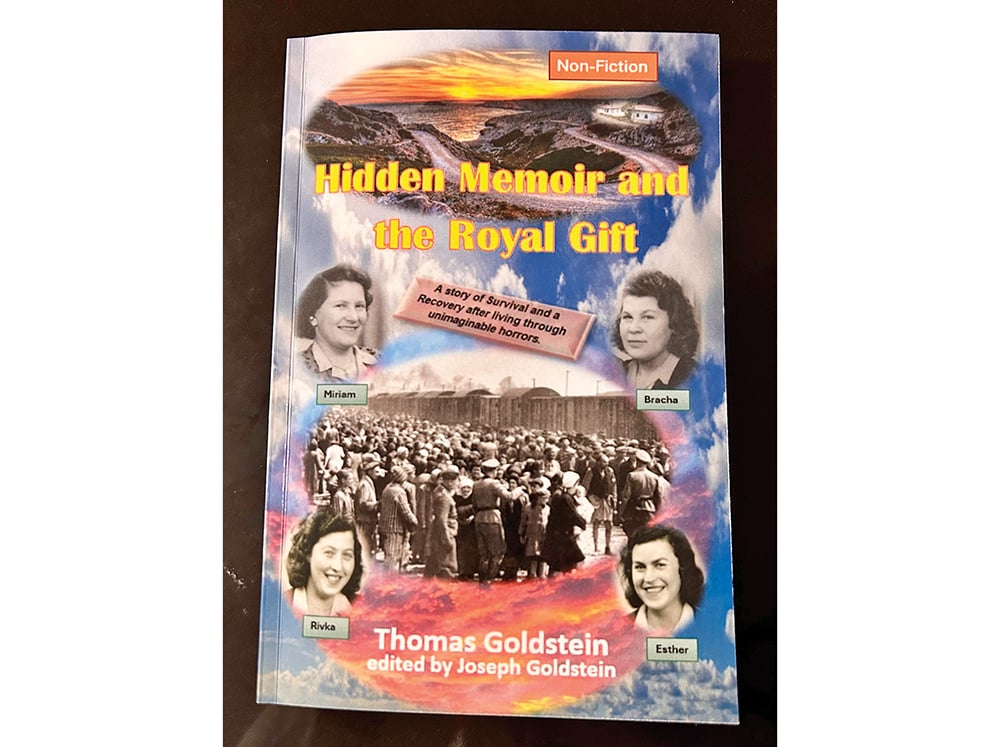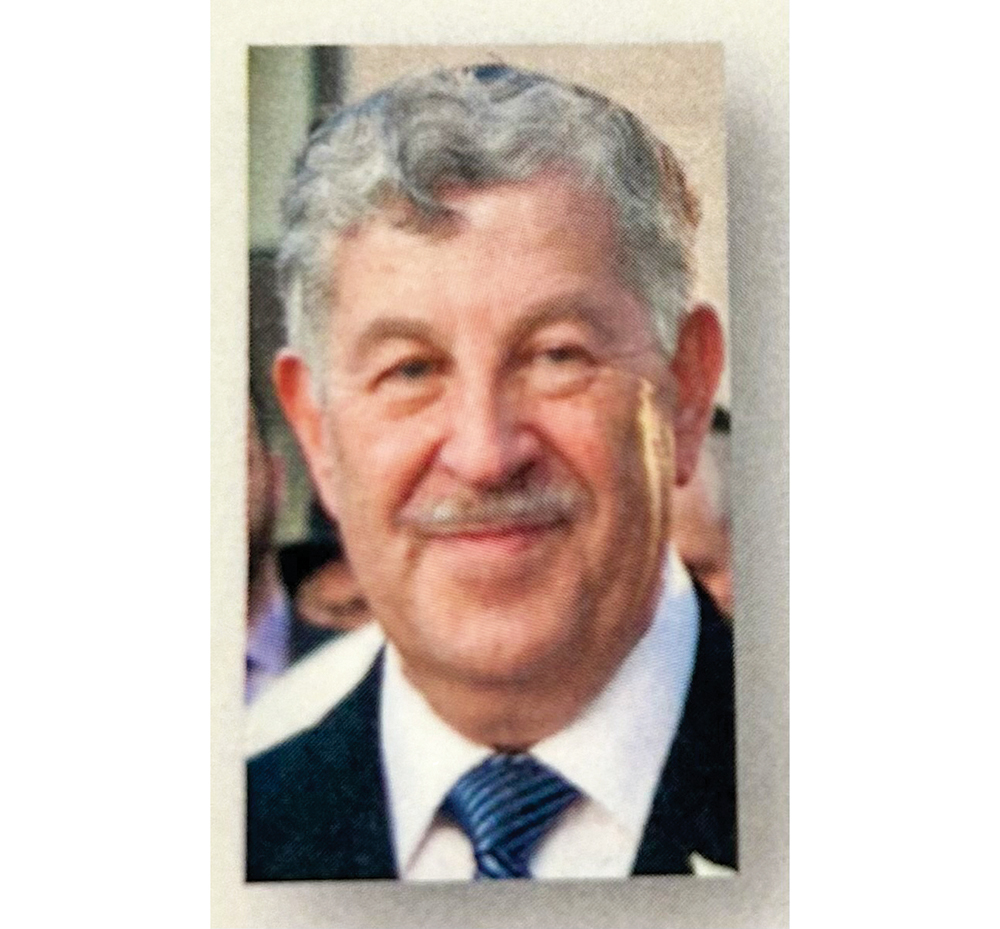
Reviewing: “Hidden Memoir and the Royal Gift: A Story of Survival and Recovery After Living Through Unimaginable Horrors” by Thomas Goldstein. Edited by Joseph Goldstein. Independently published. 2024. 204 pages. ISBN-13:
979-8324261108.
I don’t often view a new Holocaust book as something I’ll enjoy reading. I believe it’s a sacred obligation to read these stories, and serve as a witness to the vicious and sadistic cruelty European Jews faced in the nightmare years of 1939-1945. But in my experience, these accounts can often be difficult to read.
In that light, I found the new book by Thomas Goldstein of Edison—“Hidden Memoir and the Royal Gift: A Story of Survival and Recovery After Living Through Unimaginable Horrors”—about his mother’s and aunt’s ordeals in the Holocaust, to be a surprisingly approachable, informative and easy-to-read account.
Goldstein arranged the book in short chapters that allow the reader to take a break when the subject matter is heavy or they need to do something else.

He included footnotes throughout the 202-page book, printed in large, easy-to-read type, with brief explanations of cities, organizations, people and other facts mentioned in the book, and weblinks for more information.
Most importantly, the story of his mother’s survival is told in a concise and compelling fashion, with Goldstein adding informative commentary throughout.
The book is based on a newly discovered memoir that Bracha Goldstein, the author’s mother, wrote a month after being liberated from the Holocaust. Thomas Goldstein only discovered this hidden memoir 50 years later when his elderly mother grew infirm and he had to clean out her apartment in Brooklyn as she was moving out. He was surprised to find the very detailed account of her Holocaust experiences, as his mother rarely discussed her wartime experiences with her sons.
As the memoir revealed, Bracha, her husband Tzvi and their two young sons saw their peaceful and happy life in a small town in Romania upended in 1943 when the Hungarian fascist government, allied with Nazi Germany, forcibly deported Tzvi to work in a labor camp. This was followed by the government issuing a series of antisemitic decrees and propaganda to isolate and dehumanize the Jewish population. In spring 1944 Bracha, her two sons, her extended family and other residents of their town were deported to a Jewish ghetto in Oradea.
After two weeks in the ghetto, the Jews were rounded up, handed over to German troops, and forced into cattle cars. The days-long trip, in a crowded cattle car with little food and water, transported them to the Auschwitz concentration camps, where Bracha was separated from her parents, her in-laws and her sons, and experienced all forms of vicious treatment.
Bracha clung to her sister Miriam in the death camp and helped her when she became quite sick. Bracha moving describes the cruelty of the camps and the many inhumane practices the Nazis instituted to extract slave labor while gradually wearing down the Jews.
When the Jewish women were liberated and turned over to the Red Cross in the spring of 1945, they were taken to Sweden where they were nursed back to good health. Bracha and Miriam’s surviving sisters-in-law, Esther and Rivka, lived together with them in a displacement camp close to Stockholm. Bracha learned by telegram in June that her husband Tzvi survived and he wrote to her, urging her to reunite with him in Romania.
Bracha faced one big challenge in reuniting with her husband: She had no money to buy a train ticket back to her hometown. Encouraged by the other women in her barracks, Bracha decided to write to the king of Sweden, His Majesty Gustaf V, and ask if he would help her return to Romania. She enlisted a friend, Dora Schoen, who was a legal secretary, to help prepare her appeal to the king; Dora had been in the death camps with Bracha and had typed up Bracha’s memoir of the ordeal when they were recovering under the care of the Red Cross.
Bracha was shocked when she received a response from the king, in the form of two Royal Guard soldiers who visited her barracks and gave her prepaid train and ferry tickets to Romania. In addition to that, the king sent another thoughtful gift—a set of silverware with his monogram, as a gift to help Bracha and Tzvi reestablish their home.
The book goes on to describe Bracha’s joyful reunion with her husband, her struggles with depression on the loss of her two sons and other relatives, and her decision to build a new family with Tzvi. Thomas Goldstein describes how his and brother Joseph’s arrival gave Bracha new energy and new hope. The family eventually emigrated to the United States, where they built a new life in Brooklyn.
Goldstein’s book encompasses not just the Holocaust trials and post-war experiences of his mother but also summaries of the post-war experiences of his aunts Miriam, Esther and Rivka, as well as Dora Schoen, and family trees, the early life of his mother, poems by Holocaust survivors, the disposition of his mother’s memoir, and more.
I found the book very moving and an excellent window into a horrific era, seen through the eyes of a compassionate and brave woman with remarkable strength and resilience. I thoroughly recommend this book.
“Hidden Memoir and the Royal Gift: A Story of Survival and Recovery After Living Through Unimaginable Horrors” is available on Amazon.
Harry Glazer is the Middlesex County editor of The Jewish Link. He welcomes reader feedback and can be reached at harryglazer615@gmail.com.









